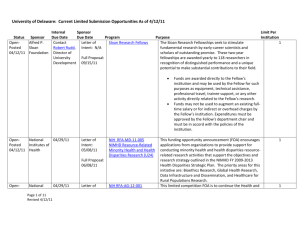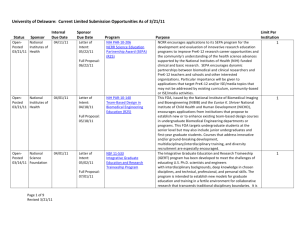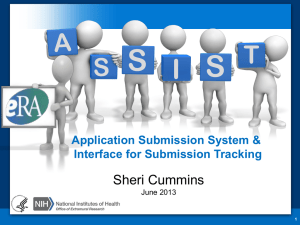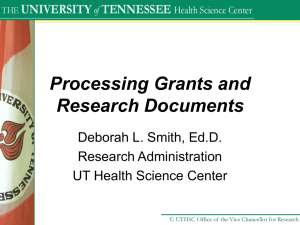Slides from Session
advertisement
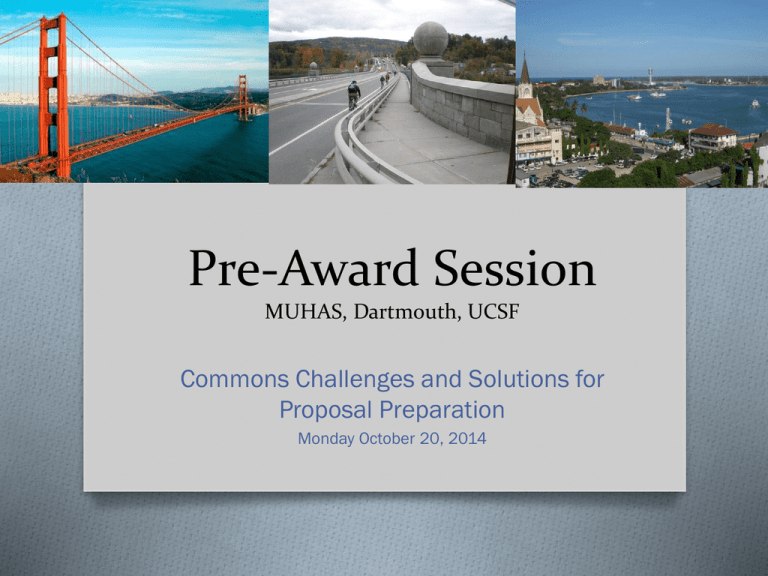
Pre-Award Session MUHAS, Dartmouth, UCSF Commons Challenges and Solutions for Proposal Preparation Monday October 20, 2014 Agenda O MUHAS Office of Sponsored Projects O Funding Opportunity Searches O Proposal Planning and Preparation O Components of a Grant Application O Time Management O Budget Development MUHAS Office of Sponsored Projects O OFFICE OF SPONSORED PROJECTS SUMMARY O The Directorate of Research and Publication is O O O O O O pleased to inform you that the Office of Sponsored Projects is now in force under DRP. The Office is going to be supportive in areas such as: Searching for Funding Opportunities Grants application and follow up Negotiation of contracts Reviewing and ensuring compliance Research administration training. It is essential to make use of this unit for the development of research Finding Sources of Funding Funding Opportunity Resources O NIH Guide for Grants and Contracts, official O O O O O publication for NIH medical and behavioral research grant policies, guidelines and funding opportunities. Sign up for a weekly email NIH Global Health Funding News http://www.fic.nih.gov/Funding/News/Pages/fu nding-news-101314.aspx Fogarty Center, NIH Pivot http://pivot.cos.com/ Scangrants http://www.scangrants.com/ Foundation Center http://www.fic.nih.gov/Funding/NonNIH/Pages/default.aspx Discussion O What funding opportunity services/sites do you currently use? O What has proven the most successful method of identifying funding opportunities? Proposal planning Proposal Challenges Avoid Common Proposal Mistakes O Read the funding announcement and associated O O O O application instructions Allow time for obtaining approvals, letters and supporting documentation Don’t wait until the last minute Allow time to send drafts to colleagues Contact sponsor to ask questions or discuss research Proposal Preparation: Initial Questions to Discuss O Settle the basic logistics O Who is going to be the Principal Investigator O What type of application/funding opportunity O Where will the project take place? O When will the project start and its duration? O Why is the activity being proposed, and does it fit within the mission of the organization? Proposals: Components Specific Aims Research Narrative Human Subjects/Animal Welfare Biographical Sketches Budget and Budget Justification Letters of Support Subcontractor Budgets, Letters Resources Data Sharing Plans Proposal Preparation: Who Is Involved? O Principal Investigator O Mentor O Collaborators O Department Administrators O Support Staff O Dean O Grants Office Discussion: Proposal Experiences at MUHAS, Dartmouth, UCSF O For a given grant deadline, how many proposals go through the grants office? O What support staff is available to assist in proposal development? O Are there senior investigators who can provide guidance or critiques? O How much time is needed to: O Review forms and application requirements? O Register on new submission systems? O Request and collect letters from collaborators? Proposal Preparation Steps O Start accumulating results and information that will add weight O O O O O to your proposal and demonstrate competence. Ask for letters of reference and collaboration at least several weeks in advance (6 to 8 weeks) of the deadline date. Remind your reference providers. Be aware of what's going on in your field so that you can include relevant material in the proposal. Do your homework to see if you can request that your proposal be sent to a specific review panel. Obtain all the relevant application forms and read and reread the instructions so that you understand the submission details clearly. Don't hesitate to contact your institution's grant office and/or the program officer at the funding agency in question. Proposal Preparation: Reviewing the Funding Announcement Start with eligibility O Is the institution eligible? O Is the PI eligible? O Is the application limited to only one proposal? Reviewing the Funding Announcement O Space and Resource Needs O Additional space required? O Need to rent or use off-site space? O Collaborations O Are other departments involved? O Are other institutions involved? O Budgetary Requirements O What is the maximum funding level? O What is the range of amounts of awards to be made? O Is cost sharing required? O Are there any restrictions on budget categories? Sample Proposal Preparation Timeline 90 - 61 days 60 - 31 days • Review announcement, guidelines • Prepare outline and develop and draft specific aims • Identify collaborators, share aims, schedule a conference call • Establish deliverables & deadlines with collaborators • Notify administrative staff of your intent to apply • Continue to draft research strategy and refine aims • Contact administrative staff and meet to review RFA • Discuss effort, cost sharing, and matching funds with chair, academic dean, or area administrators. • Request draft budgets from subcontractors (if applicable) • Share draft of proposal with colleagues/research committee 30-20 days •Obtain subcontract budgets and materials from external collaborators •Finalize budget with department •Finalize additional components of grant and provide to departmental contact •Budget Justification •Biosketches •Resources •Equipment •Narrative and Summary •Human Subjects/Animal Welfare •Data Sharing Plans •Letters of Support • Complete draft of research strategy • Meet with OSP staff for consultation and coordination of proposal, as needed. 19-8 days • Finalize cost-sharing and matching funds with chair, dean or other administrator 7-2 days • PI forwards proposal, routing form, and any needed attachments to Office of Sponsored Projects for review. (or uploads into system) • Review and respond to comments from OSP • PI completes final edits and reviews entire proposal prior to submission Sample Proposal Preparation Timeline 2 Days PostSubmission •PI reviews final proposal and indicates “ready for submission” •OSP submits application to sponsor •PI review application in sponsor system (if applicable) •Assure all parts have been received successfully. If not, make corrections •Monitor sponsor systems and emails for information on review process •Monitor systems for “just in time” requests •Receive sponsor critique and carefully review Proposal Preparation Budget Development Recent Changes: US Government Rules Change O Office of Management and Budget issues new guidance on grants called “Uniform Guidance” O Federal agencies may apply requirements to foreign organizations O Uniform Guidance revises: O O O O O O Acronyms and Definitions (Subpart A) General Provisions (Subpart B) Pre-Award Requirements (Subpart C) Post-Awart Requirements (Subpart D) Cost Principles (Subpart E) Audit Requirements (Subpart F) New “Uniform Guidance”: What Does This Mean for MUHAS? O New terminology O New rules referenced in awards and subawards O Increased emphasis on internal controls and subrecipient monitoring O Everyone is reviewing the new requirements to understand the impact. It will take time and will evolve over time Budget Development Typical Costs for Budgets O Salaries and wages O Fringe benefits O Equipment O Expendable supplies and materials O Travel O Subcontracts O Consultants O External Interdepartmental Budget Development O Read the funding announcement. Is there a cap on O O O O O O indirect costs? A percent of effort required for the PI? Meet with the PI (several times to review and correct the budget) Identify direct costs. Refer to sponsor policies on acceptable direct costs Apply institutional fringe rate Identify equipment that will be requested and obtain quotes if necessary Obtain salary information for personnel in budget Identify subcontractors, obtain their budgets and develop a composite budget Budget Development Other Common Costs O Service centers or recharge centers are common shared services that charge individual projects according to specified rates. A commonly budgeted service center is the animal care facility. O Other Direct Costs: O O O O O O O O O O Communications Publications Animal Care Costs Human Subject Costs Shop Charges Maintenance / Service Contracts Computer Costs Graphic Arts / Photographic Services Rental / Lease of Facilities Construction / Renovation / Remodeling Costs Budget Development O Here are some examples of costs that should normally be treated as F&A and NOT budgeted or charged to a grant: O General purpose equipment, furniture O Administrative costs O Administrative staff salaries O Office supplies O Cell phones, pagers, PDA’s O Memberships O Subscriptions Budget Development O Travel O Adhere to institutional policy and agency guidelines O Distinguish between domestic and foreign travel O If foreign travel is sponsored by the federal government, use federal international per diem rates Proposal Development: Subcontracts O What is the difference between a subcontractor, consultant or vendor/contractor? O Subcontractor: Entity is responsible for performing a substantive portion of the “work”, involved in programmatic decisions O Vendor(Contractor): Performs services only as part of their normal business, not a coInvestigator, not involved in publications O Consultant: May perform some research but does so sporadically throughout the project Budget Justification O Narrative written description of the basis for the requested budget items and how the amounts were calculated. O Modular budgets O Provide brief descriptions of duties for all positions listed in the budget, with the number of person months requested each year and any anticipated fluctuations. O Explain any year-to-year fluctuations in the budget Proposal Development: Internal Review O The Authorized Official (AO) of the grantee institution certifies O O O O the application prior to submission to the sponsor. In the case of grants.gov submissions, the AO approval is electronic. As part of the certification process, most institutions have an internal review process to address both sponsor and institutional issues. Typically, the Department Chair may sign to signify agreement and support with the proposed science. Some review processes involve approval for hiring new staff or expanding space. Other considerations for internal review: Limit on the number of applicants Large program involving cost sharing Unusual circumstances for the faculty appointment of the PI Proposal Review: Compliance Considerations O The sponsor and your institution will need to know if the project involves O Human subjects O Animal Subjects O Environmental health and safety issues Discussion O What is the review process in your organization? O Are proposals submitted last minute? O Is there a deadline policy? What is the Institution Signing? O Representations and Certifications O Institution’s policies O Compliance with laws and public policy concerns O Agreement with sponsor’s terms and conditions O Contracts: If you have concerns with contract terms, you can attach a cover letter and reserve the right to negotiate terms Grant Application Systems Electronic submission of grant applications is required for most NIH application types. Applicants from foreign institutions and international organizations must fulfill some additional requirements to register for electronic submission of grant applications. O NIH eSubmission Tips for International Applicantshttp://grants.nih.gov/grants/ElectronicReceipt/files/Tips_for _International_Applicants.pdf O Webinars Electronic Submission of Grant Applications for Foreign Institutions http://grants.nih.gov/grants/webinar_docs/webinar_20120927.htm O O Changes to Foreign Awards for FY13: Training for NIH Program and Grants Management Staff (10/24/2012) http://grants.nih.gov/grants/foreign/ Resources O NIH Peer Review Revealed, NIH Peer Review Revealed provides a front-row seat to a NIH peer review meeting. Real scientists from the scientific community review fictional but realistic grant applications for scientific merit. http://www.youtube.com/watch?feature=pl ayer_embedded&v=fBDxI6l4dOA Proposal Resources O Time Management 101 for Grant Applicants, Science Careers, http://sciencecareers.sciencemag.org/care er_magazine/previous_issues/articles/199 9_10_08/nodoi.14917315972206947987

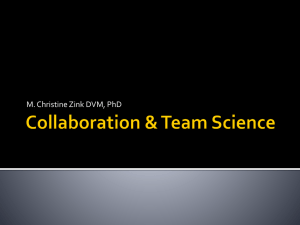
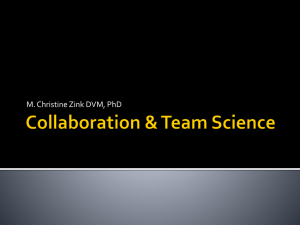

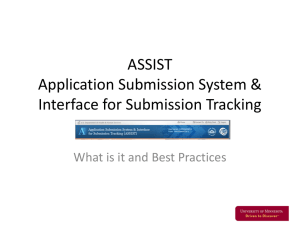
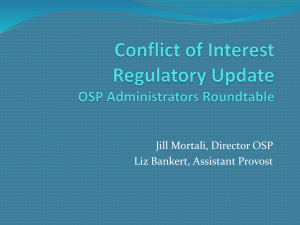
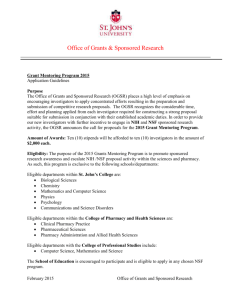
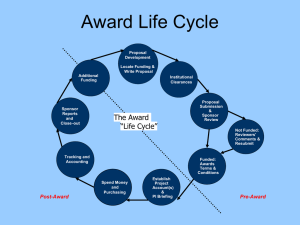
![NIH 101: Part 1 [.ppt]](http://s2.studylib.net/store/data/005398706_1-cbe361c448786ac362a8e75ad39fc05d-300x300.png)



